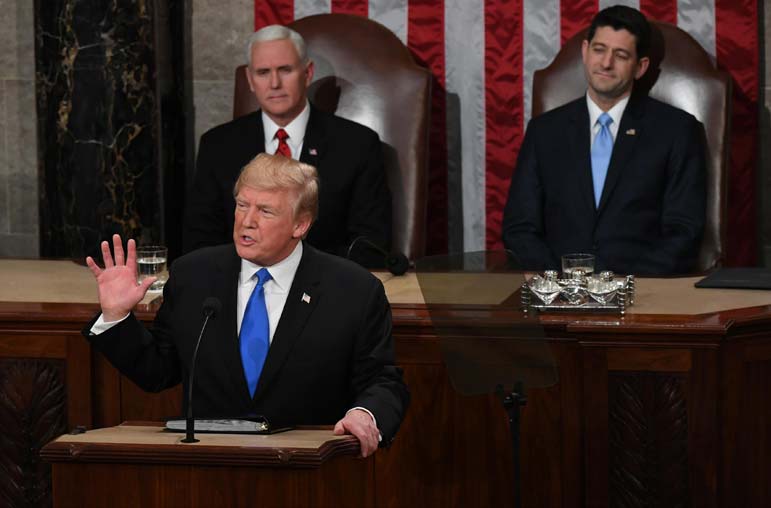 Toni L. Sandys for The Washington Post
Toni L. Sandys for The Washington Post
A fractured country needs, if anything, more such moments for reflection on common bonds and mutual obligations. Events that dignify, unify and signify our membership in this special polity, and all the reasons we should be grateful for it, faults and all. Mark me down as a big fan of them.
But one such event has long since passed its sell-by date. It no longer fulfills the civic purpose that might once have justified its existence. On the contrary, it diminishes rather than elevates respect for America and its institutions. I refer to the tasteless, classless spectacle of the modern State of the Union speech. Or SOTU, in White House parlance. The political mud-wrestling over the State of the Union address in recent weeks only underscores the reasons for my belief that it's time for this affair to be retired.
Woodrow Wilson has a lot to answer for in American history: His disdain for constitutional limits and prescriptions, his introduction of rule by unelected "experts," his refusal to disclose an incapacitating illness. But among Wilson's most regrettable legacies, at least these days, is the delivery of the constitutionally required annual message to Congress through an in-person speech.
Although George Washington and John Adams had read their messages to Congress, Thomas Jefferson, to prevent its becoming, as Wilson biographer A. Scott Berg put it, a "throne speech," sent his messages in writing. The precedent lasted 112 years. Then Wilson, prompted by a journalist's suggestion (another, ominous precedent: The publicity-minded getting involved), requested that Congress convene to receive his report in 1913, and away we went. A brief return to reticence by Calvin Coolidge and Herbert Hoover, who briefly restored written submissions, failed to take.
Franklin D. Roosevelt, the first modern media president, knew a PR opportunity when he saw one. Why just report when you can propagandize? As the official House website relates, "Designed to reach the largest possible radio audience . . . the address touted the accomplishments of the Roosevelt administration and the New Deal."
Even discounting for the horn-tooting, the occasion retained its dignity. Done with what was once customary ritual and decorum, State of the Union addresses served the communitarian civic purpose very well. Members of both parties, representatives of the judiciary and the military all listening respectfully, applauding sincerely and appropriately, made for one of those rare and valuable national convenings.
That was then. The throne speech temptation proved irresistible to skilled stage managers in the TV era. It was the Reagan White House, predictably, given its Hollywood roots, that took the speech even further from the printed word and the mere "information of the State of the Union" stipulated by the Constitution. The positioning in the balcony of Lenny Skutnik, an authentic hero of the 1982 Air Florida crash into the 14th Street bridge in Washington, set a trend that reached its ad absurdum status when President Barack Obama mentioned by name four of his more than 20 guests during his 2015 address.
After President Ronald Reagan's innovation, it dawned on everyone involved that the supporting cast need not be confined to the balconies. Members of Congress got in the act, on both sides of the aisle. Effusive, cued applause, camera-conscious backslapping, stony-faced growls of disapproval and eventually even catcalls from America's lawmakers have drained what little was left of a serious tutorial about national challenges and priorities. What remains: A tired, farcical theatrical experience more likely to promote cynicism than citizenship in its viewers.
Give Wilson and Roosevelt credit on one score: They addressed their audiences on a higher plane than their successors. On the Flesch-Kincaid readability index, their first State of the Union addresses measured at post-high school reading levels. Ever since, the vocabulary of presidential first-timers has plummeted, save for an uptick in 1982 with Reagan's debut. The most recent State of the Union required an ninth-grade reading level.
Although Wilson inflicted this now-debauched custom on the nation, he got one thing right: His first State of the Union address lasted all of nine minutes. After Reagan (who presumably knew the attention span of TV viewers), the speeches have averaged 45 minutes or more, gusting beyond an hour in the cases of Presidents Bill Clinton, Obama and Trump.
Herewith, an anguished appeal to future presidential candidates to forswear in advance the worn-out, counterproductive State of the Union spectacle, and return to the dignity and sobriety of a written report. Something different is worth a trial period; I'm thinking 112 years might be good.
Sign up for the daily JWR update. It's free. Just click here.
(COMMENT, BELOW)
Daniels, a Washington Post contributing columnist, is president of Purdue University and a former governor of Indiana.
Previously:
• 12/31/18: Things aren't as bad as we think
• 12/26/18: Where our commonality -- the values and concerns that we share instead of dividing over -- comes to life
• 12/06/18: Let's value grit over grades
• 12/03/18: Getting Washington out of D.C
• 11/12/18: The problem with scorched-earth campaigning
• 08/14/18: Government 'transparency' has gone too far
• 07/31/18: When a state is drowning in debt, should the rest of us have to pay?
• 07/10/18: Big Data is always watching
• 07/03/18: Learning from our mistakes in higher ed
• 06/14/18: Entitlement can is getting too heavy to kick
• 04/23/18: Our judgments about the past should make us a little less arrogant about the way we act today
• 12/29/17: Avoiding GMOs isn't just anti-science. It's immoral
• 12/08/17: Is anyone ever wrong anymore?


 Contact The Editor
Contact The Editor
 Articles By This Author
Articles By This Author